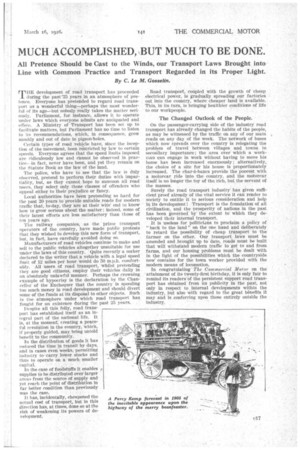MUCH ACCOMPLISHED, BUT MUCH TO BE DONE.
Page 23

If you've noticed an error in this article please click here to report it so we can fix it.
All Pretence Should be Cast to the Winds, our Transport Laws Brought into Line with Common Practice and Transport Regarded in its Proper Light. By C. Le M. Gosselin.
HE development of road transport. has proceeded I during the past '25 years in an atmosphere of pretence. Everyone has pretended to regard road transport as a wonderful thing—perhaps the most wonderful of its age--but nobody really takes the matter seriously. Parliament, for instance, allows it to operate under laws which everyone admits are antiquated and effete. A Ministry of Transport has been set up to facilitate matters, but Parliament has no time to listen lo its recommendations, which, in consequence, grow mouldy and out of date in pigeonholes.
Certain types of road vehicle have, since the inception of the movement, been restricted by law to certain speeds. Everyone agrees that the speed limits imposed are ridiculously low and cannot be observed in practire--in fact, never have been, and yet they remain on the Statute Book as the law of the land.
The police, who have to see that the law is duly observed, pretend to perform, their duties with impartiality, but, as they cannot hope to summon all road users, they select only those classes of offenders who appeal either to their prejudice or fancy.
Local 'authorities have been pretending so hard for the past 20 years to.provide suitable roads for modern traffic that, to-day, they are at their Wits' end to know how to grow serious about the matter ; indeed, some of their latest efforts are less satisfactory than those Of ten years ago.
The railway companies, as the prime transport operators of the country, have made public protests that they wished to develop this new form of transport, but, in fact have carefully avoided doing so.
Mannfacturers of road vehicles continue to make and sell to the public 'Vehicles altogether unsuitable for use under the laws of this country. Quite recently a maker declared to the writer that a vehicle with a legal speed limit of 12 miles per hour would do 50 m.p.h. comfortably. All users of road transport, whilst pretending they are good citizens, employ their vehicles daily in an absolutely unlawful manner. Perhaps the crowning example of hypocrisy is the declaration by the Chancellor of the Exchequer that the country is spending too much money in road development and should divert some of the funds at its disposal to other objects. Such is theatmosphere under which road transport has fought for an existence during the past 25 years.
Despite all this folly, road .trans
port has established itself as an integral part of the national life. It is, at the moment -creating a peaceful revolution in the country, which, if properly guided, may bring untold benefit to the community.
In the distribution of goads it has -reduced the time in transit by days, and in cases even Weeks, permitting industry to -carry lower stocks and thus to operate on a much smaller
capital. ' in the ease of foodstuffs it enables supplies to be distributed over larger areas from the source of supply and yet reach the point of distribution in far better condition than previously was the case.
It has, incidentally, cheapened the actual cost of transport, but in this direction has, at times, done so at the risk of weakening its powers of development. Road transport, coupled with the growth of cheap electrical power, is gradually spreading our factories out into the country, where cheaper land is available. This, in its turn, is bringing healthier conditions of life to our workpeople.
The Changed Outlook of the People.
On the passenger-carrying side of the industry road transport has already changed the habits of the people, as may be witnessed by the traffic on any of our main roads on any day of the week. The network of buses which now spreads over the country is relegating the problem of travel between villages and towns to secondary importance; the area over which a workman van engage in work without having to move his home has been increased enormously ; alternatively, the choice of a site for his house is proportionately increased. The char-d-bancs provide the poorest with a InOtorear ride into the country, and the motorcar itself is no longer the toy of the rich, but the servant of the masses. .
Surely the road transport industry has given sufficient proof already of the vital service it can render to society to entitle it to serious consideration and help in its developinent! Transport is the foundation of all civilization, and the prosperity of nations in the past has been governed by the extent to which they developed their internal transport.
It is useless for politicians to proclaim a policy of "back to the land on the one hand and deliberately to retard the possibility of cheap transport to the farmer on the other. Our transport laws must be amended and ,brought up to date, roads must be built that will withstand modern traffic to get to and from farms, and our housing problems must be dealt with in the light of the possibilities which the countryside now' contains for the town worker provided with the modern means of locomotion.
In congratulating The Commercial Motor on the attainment of its twenty-first birthday, it is only fair to remind its readers of the persistent support road transport has obtained from its publicity in the past, not only in respect to internal developments within the industry, but also with regard to the great bksflts it may and is conferring upon those entirely outside the industry.


























































